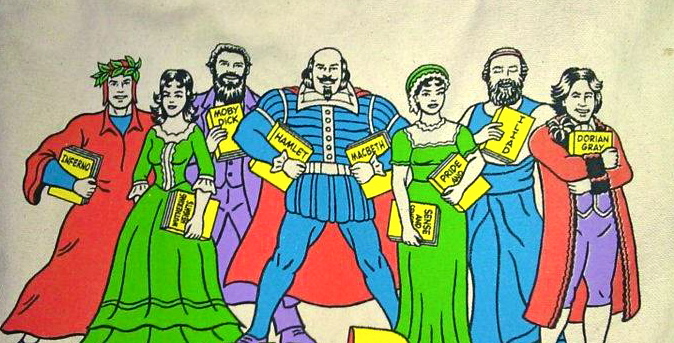In our very first interview for this project, we spoke at length with Professor Asher about the Western canon and the attempt at Geneseo to make the humanities sequence a more global course. Professor Asher admitted that he is completely understanding and supportive of these efforts, but explained how difficult it is to make the humanities a global course given the current structure of Geneseo’s educational practices. He explained the menu system of choosing texts: professors have a choice from a selection of texts in different areas, for instance, there are several different options for the 19th century text from which a professor may select. Professors also have the option of bringing in non-canonical texts, but they must receive approval from administrators later explain their experience of teaching the text. While Professor Asher demonstrated that the menu system has worked fairly well, he commented that “one of the things that’s been a difficulty is that it [choosing a text] is a zero sum game; so in other words, if you want to put on Confucius, then Plato has to fly out.” Which isn’t that big of a problem in itself, he admitted, but added, “to me, the bigger difficulty is who is qualified to teach all those [global texts …] we don’t have anybody in Chinese philosophy here. We did at one time, but we don’t now. But that would even then just be one person.” Professor Asher’s point really resonated with me (even though I am a huge proponent of a global humanities and integrating canonical and non-canonical texts). He added, “I don’t want the global stuff to just become symbolic [of representing other cultures]—I think its disrespectful,” to teach a text after “hearing just one lecture on it, and then sit it in front of the students. So it’s really not out of a conservative western point of view, but really, you have to be academically responsible.” When we asked if there were any solidified attempts to add non-canonical texts, he explained that a history professor is giving several workshops on the Quran in order to add Islamic studies to the intellectual history of the West, and said that the process was working out pretty well, and looked like expansion was a possibility in the future.
Ultimately, however, Professor Asher made it clear that the emphasis on the Western canon is a function of a lack of monetary resources. To make this point, he used the example of the English department’s lack of a Shakespeare specialist (we have people who teach Shakespeare, but no Shakespearean expert). “If we can’t even fill Shakespeare,” he asked, where are we supposed to find the money to staff 26 sections of a global humanities course? Other professors were cognizant and sympathetic of this issue. Professor Behrend admitted that as a professor of American history, he wasn’t sure how much his course would change if it was made a global class. He added, however, that “what [he] found interesting in reading Locke, is how influenced some western philosophers are by native peoples. Sometimes it’s a matter of whether you choose to be aware of that or not.”
Professor Kirk, in her Humn 2 course, frequently exchanges non-western texts when she can. According to her, “you can’t have a west without a non-west. You have to understand what the non-west, or non-wests are. The west only became as great as it did because it drew from the non-west—often in not so kind ways.” She added, “I choose texts that give insight to the west/non-west binary.” Professor McCorkle shared a similar sentiment; although she does not currently teach the humanities, she explained that teaching Eastern humanities wouldn’t “be an intrusion on western thought” because “so many philosophers like Nietzsche and Schopenhauer identify their influences being in eastern philosophy—it would be totally relevant to the current curriculum.” When asked what texts she thinks should be a part of the humanities curriculum, she replied that at the very least, students should be familiar with Confucius, Zen Buddhism, Hinduism, and Middle Eastern texts.
Katherine Zaslavsky, a senior sociology major who will graduate in the spring of 2017, said that she’s tired of the western canon that is dominated by dead white males. Personally, I would agree, but this is not to say canonical texts are without value. She explained that the western canon limits our awareness and understanding of different viewpoints, and contributes to the idea that there are culturally legitimate sources of information: a “pretty big issue of contention in sociology” is “the issue of viewpoint and the fact that if you only get information from what are seen as legitimate viewpoints you’re actually cutting out a lot of things that are seen as illegitimate not because they’re unreliable or because they’re not verifiable, there seen as illegitimate because they’re not seen as tradition sources.” In the interview, Emily added that this is a similar issue that permeates discussions in the English department—highlighting the strong interdepartmental influence of the liberal arts at Geneseo.
